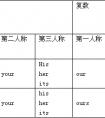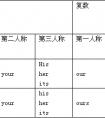句型转换。1. Remember we're going to the theatre tonight. (同义句) __________ we're going to the theatre tonight.2. Please go and get my glasses for me fro-九年级英语
祈使句特点口令:
祈使句无主语, 主语you常省去;
动词原形谓语当, 句首加don't否定变;
朗读应当用降调, 句末常标感叹号。
祈使句的语调特点 :
1、语音强度一般比陈述句重,书面上用叹号表示。
2、句末用降调,较长句子的后半部分几个音节速度加快。
对特定的人使用的祈使句:
祈使句如Wait here! (在这儿等着!) 可以是对一个人说,也可以是对几个人说,其主语暗含you。
但我们却可以用下列方式引起我们说话的对象的注意:
■You+祈使语气动词
You wait here for a moment. 你在这儿等一会儿。
语调和重音很重要。在上面这一句里,如果不重读you,那么句子的意思是this is where you wait (这就是你应等着的地方);
如果重读you,那么句子的意思就是this is what I want you to do (这是我要你做的事)。
此外,重读you时还可以表示愤怒、敌意或不客气。如:
You mind your own business! 不关你什么事
You try teaching 40 noisy children five days a week! 你来试试每周5天教40个吵闹的孩子!
在否定句中Don’t要重读 (不重读you)。如:
Don’t you speak to me like that! 你别这样跟我讲话!
■“you+人名”或“人名+you”
You wait here, Jim, and Mary, you wait there. 你等在这儿,吉姆;玛丽,你等在那儿。
■“祈使语气+人名”或“人名+祈使语气”:
Drink up your milk, Sally! 把你的牛奶喝光,萨利!
Sally, drink up your milk! 萨利,把你的牛奶喝光!
■祈使语气+反身代词
Enjoy yourself. 你好好享受吧。
Behave yourself. 你放规矩点。
■对一群人讲话时,祈使语气可与everybody, someone之类的词连用:
Everyone keep quiet! 大家安静!
Keep still everybody! 每个人都保持不动!
Nobody say a word! 都不许说话!
Somebody answer the phone please. 请来个人接电话。
■在表示否定的命令语气后面可用带any的复合词
Don’t say a word anybody! 谁都不要说话!
Don’t anybody say a word! 任何人都不许说话!
考点名称:实义动词
- 实意动词:
即行为动词,表示动作的动词。实义动词与系动词是相对的,能独立用作谓语。
它分为及物动词和不及物动词两种:
及物动词是指后面要求有直接宾语的动词;
不及物动词指后面不需要跟宾语的动词。 实意动词使用方法:
及物动词
后面必须跟宾语意义才完整的实义动词,叫做及物动词(transitive verb)。如:
I believe that the committee will consider our suggestion.我相信委员会将会考虑我们的建议。
“How long can I keep the book ?”Harry asked.哈里问:“这本书我可以借多久?”
Dr. Bethune set us a good example. 白求恩大夫给我们树立了好榜样。
Crude oil contains many useful substances.原油含有许多有用的物质。
不及物动词
本身意义完整后面不须跟宾语的实义动词,叫做不及物动词(intransitive verb)。如:
Birds fly.鸟会飞。
It happened in June 1932.这件事发生于一九三二年六月。
My watch stopped.我的表停了。
She spoke at the meeting yesterday evening. 她在昨天晚上的会上发了言。
兼作及物动词和不及物动词
英语里有不少实义动词可以兼作及物动词和不及物动词。这样的动词又有两种不同的情况
a)兼作及物动词和不及物动词时,意义不变。试比较:
Shall I begin at once?我可以立刻开始吗?(begin作不及物动词)
She began working as a librarian after she left school.她毕业后当图书馆管理员。(began作及物动词)
When did they leave Chicago?他们是什么时候离开芝加哥的?(leave 作及物动词)
They left last week. 他们是上周离开的。(left 作不及物动词)
b)兼作及物动词和不及物动词时,有时意义不尽相同。如:
Wash your hands before meals.饭前要洗手。
Does this cloth wash well? 这布经得起洗吗?- 英汉实意动词用法比较:
与汉语的比较,有时英语动词的及物和不及物的用法,与汉语的用法不一样,请注意下列两种情况:
a)有的动词在英语里只能用作不及物动词,而汉语则可用作及物动词,如arrive到达,agree同意,listen听。英语里这些动词后面常接介词。如:
We arrived at the railway station at noon.
我们于中午到达火车站。(at不能省去)
(比较:We reached the railway station at noon.)
Everybody listened to the lecture with great interest.
每个人都很有兴趣地听讲课。(to不可省去)
(比较:We all heard the lecture.)
Do they agree to the plan?他们同意这个计划吗?(to不可省去)
b)有的动词在英语里能用作及物动词,而在汉语里则不能用作及物动词,如serve为…服务。
Our children are taught to serve the people wholeheartedly.
我们的儿童被教以全心全意为人民服务
用于be动词之后,实义动词之前。 实意动词的用法:
肯定句:
主语+动词过去式+其它
否定句:
主语+助动词didn‘t+动词原型+其他
一般过去式:
Did+主语+动词原型+其他
考点名称:介词短语
- 介词短语:
介词是一种用来表示词与词, 词与句之间的关系的词。在句中不能单独作句子成分。
介词后面一般有名词代词或相当于名词的其他词类,短语或从句作它的宾语。介词与它的宾语构成介词词组,在句中作状语,表语,补语,定语或介词宾语。例如:at ,in, on, to
介词短语在句中可以作状语,定语,表语,补足语等。
1. 作表语
例如:It was in 2005 in Beijing.
2. 作宾语补足语
例如:He found his dog outside the station.
3. 作后置定语
例如:I even store them in boxes under my bed.
4. 作状语
例如:You are supposed to put your bread on your plate. - 常见介词用法:
1)at,in,on在……范围
at (1)表示在小地方; (2)表示“在……附近,旁边”
in (1)表示 在大地方; (2)表示“在…范围之内”。
on 表示毗邻,接壤
to 表示在……范围外,不强调是否接壤
He arrived at the station at ten.
He is sitting at the desk.
He arrived in Shanghai yesterday.
Jiangsu lies in the east of China.
Russia live on the north of China.
Fujian is to the south of Jiangsu Province.
2)above, over, on 在……上
above 指在……上方,不强调是否垂直,与 below相对;
over指垂直的上方,与under相对,但over与物体有一定的空间,不直接接触。
on表示某物体上面并与之接触。
The bird is flying above my head.
There is a bridge over the river.
He put his watch on the desk.
3)below, under 在……下面
under表示在…正下方
below表示在……下,不一定在正下方
There is a cat under the table.
Please write your name below the line. 介词短语组织形式及实例:
一、介词+名词形式
第一组
by accident 偶然
on account of 因为,由于
in addition 另外
in addition to 除 …… 之外
in the air 在流行中,在传播中
on (the/an) average 平均,一般来说
on the basis of 根据,在 …… 的基础上
at (the) best 充其量,至多
for the better 好转,改善
on board 在船 ( 车、飞机 ) 上
out of breath 喘不过气来
on business 因公,因事
in any case 无论如何,总之
in case of 假使,万一
in case 假如,以防 ( 万一 ) 免得
in no case 决不
第二组
by chance 偶然,碰巧
in charge (of) 负责,主管
(a) round the clock 昼夜不停地
in common 共用,共有,共同
in conclusion 最后,总之
on condition that 在 …… 条件下
in confidence 信任
in connection with/to 关于
in consequence 因此,结果
in consequence of 由于 …… 的缘故
on the contrary 反之,正相反
in contrast with/to 与 …… 成对照
out of control 失去控制
under control 被控制住
at all costs 不惜任何代价
at the cost of 以 …… 为代价
第三组
in the course of 在 …… 过程中,在 …… 期间
of course 当然,自然,无疑
in danger 在危险中,垂危
out of danger 脱离危险
out of date 过期 ( 时 ) 的
up to date 时新的
in debt 欠债
in detail 详细地
in difficulties 处境困难
in the distance 在远处
off duty 下班
on duty 值班,上班
on earth 究竟,到底
at all events 无论如何
- 最新内容
- 相关内容
- 网友推荐
- 图文推荐
| [家长教育] 孩子为什么会和父母感情疏离? (2019-07-14) |
| [教师分享] 给远方姐姐的一封信 (2018-11-07) |
| [教师分享] 伸缩门 (2018-11-07) |
| [教师分享] 回家乡 (2018-11-07) |
| [教师分享] 是风味也是人间 (2018-11-07) |
| [教师分享] 一句格言的启示 (2018-11-07) |
| [教师分享] 无规矩不成方圆 (2018-11-07) |
| [教师分享] 第十届全国教育名家论坛有感(二) (2018-11-07) |
| [教师分享] 贪玩的小狗 (2018-11-07) |
| [教师分享] 未命名文章 (2018-11-07) |






